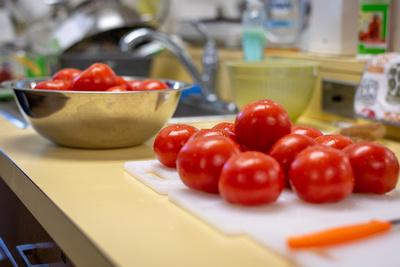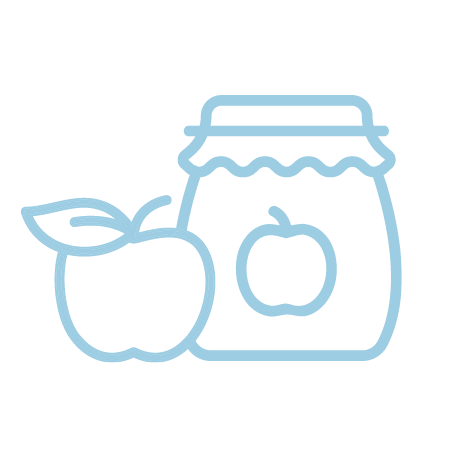
New Online Course: Maryland Food Ventures
If you are starting a value-added food business in Maryland, sign up today for the Maryland Food Ventures interactive self-paced online course! This course covers information for food subject to Maryland Cottage Food or On-Farm Home Processing regulations like high acid jams, most breads, dried herbs, and raw honey.
Topics include: Product Development, Food Safety & Licensing, Marketing, Packaging, Financing & Pricing
For a limited time only, register for FREE today!
What is The Cottage Food Law?
"In 2012, Maryland passed a modified Cottage Law, allowing for citizens to operate a home based bakery or home food processing company."
5/27/2020: FDA: Voluntary Reporting of Temporary Closures or Requesting Assistance for FDA-Regulated Food Establishments During COVID-19 Pandemic
5/22/2020: FDA & USDA: Food and Agriculture: Considerations for Prioritization of PPE, Cloth Face Coverings, Disinfectants, and Sanitation Supplies During the COVID-19 Pandemic
5/22/2020: FDA: FDA Announces Temporary Flexibility Policy Regarding Certain Labeling Requirements for Foods for Humans During COVID-19 Pandemic
10/1/2019: A cottage food business may sell their cottage food products to a retail food store
For more information on Maryland Cottage Law and selling cottage foods to retail, visit: The Maryland Department of Health
For more information about starting your own Cottage Food Business, contact:
Shauna Henley | shenley@umd.edu | 410-887-8090
Food Safety Modernization Act (FSMA)
The Food Safety Modernization Act (FSMA) amended the Food, Drug and Cosmetic Act (FDCA) of 1938, giving the Food and Drug Administration (FDA) the authority to mandate preventive-based controls across the food supply chain.
FSMA is the first major legislative reform of FDA's food safety authorities since 1938 and is shifting FDA’s focus from reacting to food contamination incidents to proactively preventing contamination.
Finalized in 2015, FSMA aims to strengthen the U.S. food safety system by stressing three fundamental strategies: prevention, increased surveillance, and better response and recovery in case of an outbreak of a foodborne illness The law covers U.S. food facilities and calls for greater oversight of the millions of food products entering the United States from other countries every year.
Foundational Rules
At every step of the food system supply chain, covered entities are required by law to comply with the standards created under FSMA. There are seven foundational rules that establish uniform minimum standards for food safety, starting with the growers and foreign suppliers, all the way to the packers, processors, transporters, and retailers of foods intended for human or animal consumption.
-
Standards for the Growing, Harvesting, Packing, and Holding of Produce for Human Consumption: (referred to as the Produce Safety Rule (PSR)): establishes standards for the growing, harvesting, packing, and holding of produce for human consumption. This rule applies to most producers who grow fruits and vegetables and other raw agricultural commodities. Check out the PSR Overview page for more information.
-
Current Good Manufacturing Practice and Hazard Analysis and Risk-Based Preventive Controls for Human Food: (referred to as the Preventative Controls Rule (PCR)): establishes current good manufacturing practices, hazard analysis, and risk-based preventive control for processed foods intended for human consumption.
-
Current Good Manufacturing Practice and Hazard Analysis and Risk-Based Preventive Controls for Food for Animals: (another PCR rule): establishes current good manufacturing practices, hazard analysis, and risk-based preventive control for processed foods intended for animal consumption.
-
Foreign Supplier Verification Programs (FSVP): requires that importers perform certain risk-based activities to verify that food imported into the United States has been produced in a manner that meets applicable U.S. safety standards.
-
Mitigation Strategies to Protect Food Against Intentional Adulteration: aimed at preventing intentional adulteration from acts intended to cause wide-scale harm to public health, including acts of terrorism targeting the food supply.
-
Sanitary Transportation of Human and Animal Food: establishes requirements for shippers, loaders, carriers by motor or rail vehicle, and receivers involved in transporting human and animal food to use sanitary practices to ensure the safety of that food. The requirements do not apply to transportation by ship or air because of limitations in the law.
-
Voluntary Qualified Importer Program (VQIP): voluntary fee-based program that provides expedited review and import entry of human and animal foods into the United States for participating importers.
A list of finalized rules and guidance documents can be found on FDA’s webpage.
Maryland producers must also be aware of local regulations they must comply with, including the rules for acidified foods.
Preventive Controls Rules (PCR) Overview
Preventive Controls for Human Food (Part 117), and Preventive Controls for Animal Food (Part 507) Current Good Manufacturing Practice, Hazard Analysis, and Risk-Based Preventive Controls for Human & Animal Food
The Preventive Controls Rule for Human Food and the Preventive Controls Rule for Animal Food of FSMA create new requirements and update existing standards for facilities that manufacture, process, pack, or hold food for humans & animal consumption. The PCRs operate to ensure all food facilities produce safe foods and that the FDA can quickly determine the location and source of potential food-borne illness outbreaks and notify affected facilities.
The key provisions of both of the Preventive Controls Rules include:
-
Hazard Analysis: Facilities must have a food safety plan that addresses multiple aspects.
-
A Hazard Analysis and Critical Control Point (HACCP) Plan is required and must identify and evaluate hazards for each type of food manufactured, processed, packed, or held at the facility, including the potential biological, chemical, and physical hazards.
-
A critical control point (CCP) is a point, step, or procedure in a food process where control is essential to prevent, reduce, or eliminate food safety hazards. The types of preventive controls you use will depend on the facility and the food.
-
-
Preventive and monitoring controls: The written food safety plan must also identify preventive and monitoring controls that will significantly minimize or prevent hazards. Preventive controls include process controls, food allergen controls, sanitation controls, supply-chain controls, a recall plan, and may also include worker training on the principles of food hygiene and food safety, and other current good manufacturing practices.
-
Corrective actions & Corrections: Also in the food safety plan must be considerations for the oversight and management of the preventive controls, including corrective actions and corrections that can be timely taken to identify and correct minor, isolate problems that occur during food production to reduce the likelihood that a problem will recur. Steps must also be outlined to evaluate affected food for safety and to prevent it from entering commerce. Corrective actions must be documented with records.
-
Verification of implementation and effectiveness: The food safety plan must also provide for activities that verify that the preventive controls are consistently implemented and effective. Verification measures include scientific evidence that a control is capable of effectively controlling an identified hazard, calibration and accuracy checks of process monitoring instruments (e.g. thermometers) and reviewing the records to ensure employees are monitoring and taking corrective actions when necessary.
-
Current “Good Manufacturing Practices” (CGMPs): The rule makes some CGMPs for education and training binding to ensure employees are qualified to perform their duties. The rule also explicitly provides that allergen cross-contact is addressed by the CGMPs.
-
Supplier programs: The rule mandates that a manufacturing/processing facility have a risk-based supply chain program for those raw material and other ingredients for which it has identified a hazard requiring a supply-chain applied control. Manufacturing/processing facilities that control a hazard using preventive controls, or who follow requirements applicable when relying on a customer to control hazards, do not need to have a supply-chain program for that hazard. For Supply-Chain Program compliance dates, go to: https://www.fda.gov/food/food-safety-modernization-act-fsma/fsma-compliance-dates#HumanFood
-
Preventive Controls Qualified Individual (PCQI): The PCR also requires that the food safety plan be developed and applied by a Preventive Controls Qualified Individual (PCQI) who has successfully completed training in the development and application of risk-based preventive controls at least equivalent to that received under a standardized curriculum recognized as adequate by FDA or be otherwise qualified through job experience to develop and apply a food safety system. Job experience may qualify an individual to perform these functions if such experience has provided an individual with knowledge at least equivalent to that provided through the standardized curriculum. In general, FDA will assess the adequacy of a facility’s food safety plan rather than an individual’s documented qualifications. Deficiencies in the food safety plan indicate that a PCQI may need additional training specific to the rule, irrespective of documented training and experience.
-
Farms that pack and hold for other farms: The rule categorizes on-farm activities as either primary or secondary.
Additional Resources
Contact Us
Rohan Tikekar, PhD, Shauna C. Henley, PhD Dr. Catherine C. Liu
rtikekar@umd.edu Shenley@umd.edu cathyliu@umd.edu
301-405-4509 410-887-8090 (410) 651-6636

